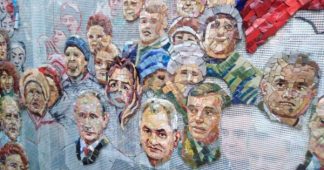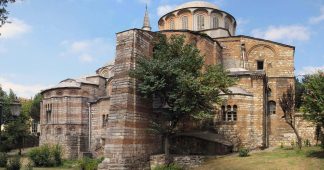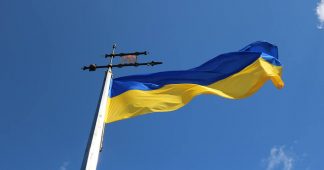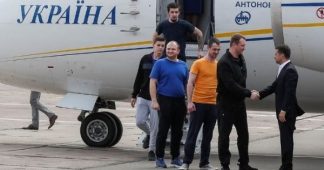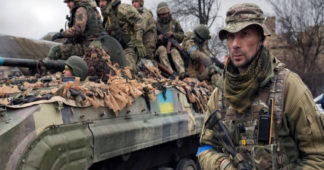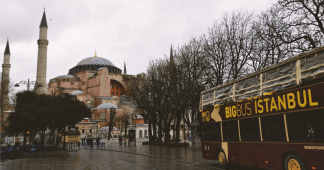by Vassilis Xidias (*)
The martyred Ukrainian Orthodox Church remains the only pillar of unity for the parted soul and harts of Ukrainian nation.
There are two parallel wars going on right now in Ukraine: one, with arms, aiming at the division of territories; and a second one, with religious means, equally relentless, aiming at the partition of the harts and souls of the Ukrainians. Our notion and understanding of the latter is as fragmentary and misleading as the one we have of the former. Nevertheless, it is not difficult for one to see who is on the cross, suffering the most. It is the Ukrainian Orthodox Church (UOC), which, despite all that is going on, still today encompasses the vast majority of Ukrainians and expresses their collective psychicism.
This martyred Church finds itself this very moment between Scylla and Charybdis: (a) Its leader, Metropolitan Onuphry of Kiev, denounced the Russian invasion as a “fratricidal war” (“a repetition of the sin of Cain”, he said), but at the same time still remains under the spiritual jurisdiction of the Moscow Patriarchate, which is backing Putin’s policies. (b) The faithful of this Church participate at the defense of their own country, they pray and fight for the peace and integrity of their fragmented homeland, for the healing of physical and mental wounds of their compatriots, while they are persecuted as traitors. A bill has been submitted to the Ukrainian parliament to ban the UOC as part of Russian Church, and at the same time there is an escalation of persecution acts, official and unofficial (illegal confiscation of temples, acts of brutal violence, etc). There also have been complains that the Ecumenical Patriarchate of Constantinople makes plans to exploit the internal contradictions of UOC to provoke separatist tendencies.
But there is a crucial question: Who will benefit from a possible dissolution or degradation of the UOC?
National identity and the church
As time goes on, whether we like it or not, we are forced to study deeper the drama of the Ukrainian people, and we are little by little realizing the roots of the problem. It is not only the geopolitical conflict of the superpowers (USA-Russia), nor the cockfights of the outside ecclesiastical institutions (Moscow and Phanar), nor even their demonic combination. At the root of the Ukrainian drama lies a deep division between the Ukrainians themselves, who for centuries now seem to squint towards Orthodox Russia and the Catholic Poland. In the passing of centuries this spiritual polarization has taken various forms and has penetrated Ukrainian Orthodoxy itself. This is something that has affected in one way or another all Orthodox churches, but in the case of Ukraine this cultural blur goes beyond the purely spiritual dimension concerning faith and dogma, and has penetrated the national psychicism, leading to a fragile and fluid national identity.
This historical condition made the Ukrainian Orthodox Church one of the pillars of mental unity of the Ukrainians, probably the most important. Due to its peculiar ethno-political status, and by following the historical transformations, it reflected the unstable balance between the Russian East and the Polish West. And that is exactly why it was – and it still remains – a key cohesive pillar of the fragile national unity. All those who now accuse Putin of dividing Ukraine territorially may not understand that a possible weakening or abolition of the Ukrainian Orthodox Church will mean the end of Ukraine itself as a united nation – it is the irony of the heterogony of ends.
The provoked amplification of a real polarization
At this point we need to make a brief flashback to the recent past of the ecclesiastical problem of Ukraine. It all started in the distant 1991-92, when the then Metropolitan of Kiev, Filaret Denysenko, failed to be elected as Patriarch of Moscow. Just after his misfortune he demanded the “autocephaly” of the Ukrainian Church (to be self-headed, self-determined), even claiming the status of Patriarchate. For a while this seemed to have been just his personal concern. But some years later Filaret’s personal vanity became a part of the US’ geopolitical plans. That happened when the United States decided to cut Ukraine off from Russia – not only politically, but also culturally and mentally. It is very much alike with what has happened with the influence of the small minority groups marked with the pro-Nazi Ukrainian nationalism of the notorious Stepan Bandera. All these became powerful levers of a top-down and from outside reshaping of the national consciousness of Ukrainians. The entire arsenal of the American deep state was mobilized. Thus, what would otherwise be some marginal groups, managed within two or three decades to dominate the public life of the country and systematically permeate the consciences of the Ukrainians. Another factor that contributed to the formation and the success of this plan was the role of the Ukrainian diaspora in the West.
In contrast to all this, the UOC has remained one of the few balancing pillars of an open and non-fanatical national consciousness: On one hand it is Ukrainian in all respects, and with an independent administrative structure (autonomous from the Patriarchate of Moscow). But on the other hand it is inclusive of the spiritual ties with Russia that permit the coherence of the Ukrainian identity, balancing the cultural dichotomy between East and West. And unfortunately, it was in this delicate and sensitive condition that the Ecumenical Patriarchate of Constantinople invaded like a bull in a china shop. I do not know what was the real reason for the Ecumenical Patriarchate to decide to interfere in this rough way after so many years of inaction. I have personally argued that this move was dictated to him by the US. The Patriarch Bartholomew himself denies this accusation and invokes other, ecclesiastical reasons (i.e. the attitude of the Russian Church when it abstained from the Pan-Orthodox Synod of Crete in 2016, etc.). He obviously does not understand that this argumentation makes his act even worse. Because in this way he clearly admits that he treated Ukraine manipulatively, just as a boxing ring to resolve his differences with Moscow. And of course, everything else is just pretext: i.e. the unhistorical meticulous arguments regarding church canon laws, the simplistic justification that all nations should have their own independent church structure etc. All these are excuses after the decision was made. Whether that was because of US blackmail or because of its own initiative, the fact is that Ecumenical Patriarchate did not intervene in Ukraine as a peacemaker, but as someone who added fuel to the fire that was burning the country from within and from without.
Is there a time for repentance?
Now, given the catastrophe at the political field, the Ecumenical Patriarch says that what is happening in Ukraine “it is a disgrace that will stigmatize for ever those who caused it, those who turned out to have no fear of God.” He is absolutely right. But I am not sure that he can hear his own words as self-criticism.
I wonder: Is it possible at this point to prevent the complete destruction of the Ukrainian national identity? I am not in position to answer this question. But what I am certain of is this: If such a possibility does exists to some extent, it would be strengthened if all parties involved in the Ukrainian drama extended their hands to the Ukrainian Orthodox Church. Not for them to assist her, but to ask of her to help in the preservation – if it is still possible – of the Ukrainian unity.
(*) Theologian, political commentator and philosopher
We remind our readers that publication of articles on our site does not mean that we agree with what is written. Our policy is to publish anything which we consider of interest, so as to assist our readers in forming their opinions. Sometimes we even publish articles with which we totally disagree, since we believe it is important for our readers to be informed on as wide a spectrum of views as possible.
